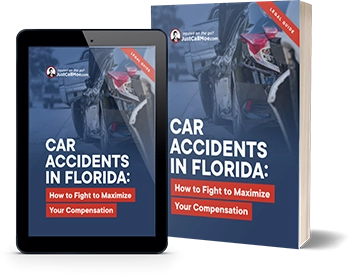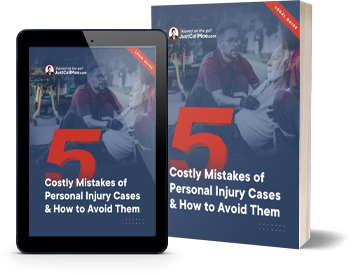Motorcycle accidents are life-changing events for many riders. After a serious wreck, motorcyclists can struggle to pick up the pieces and return to normal. Physical disabilities often last for decades, while emotional scars never fade.
Helpfully, motorcyclists can make an injury claim for compensation when another motorist or entity is liable for the accident. These settlements provide money for ongoing medical treatment and replace lost income, but it is critical to work with a lawyer who understands motorcycle accident trauma. An inexperienced attorney might undervalue your claim because they do not know the full repercussions of these accidents. JustCallMoe today. You can meet with a Winter Haven motorcycle accident lawyer at our firm for a free introductory consultation.
Long-Term Physical Disabilities After an Accident
One obvious part of motorcycle accident trauma is physical disability. Motorcyclists enjoy no buffer between them and other vehicles out on the road, so they can suffer the full impact of any crash. This trauma leads to catastrophic injuries:
- Traumatic brain injuries (TBIs)
Even if you are wearing a helmet, you can still suffer a moderate or severe TBI in a crash. These injuries often cause long-lasting impairments. For example, the Centers for Disease Control reports that five years after a moderate TBI:
- 57% of people were still physically impaired
- 50% returned to the hospital at least once a year
- 55% were unemployed
- 33% needed help from other people with daily activities
- 29% used alcohol or illegal drugs
- 12% lived in a nursing home
These numbers show the continuing, long-term trauma a motorcyclist can endure if they are hurt in a wreck. There are no easy cures for serious brain injuries.
- Spinal cord injuries
Any injury to the spinal cord can result in impaired movement or loss of feeling. The spine can suffer a direct injury, such as being torn or shredded, or the vertebrae might compress the spine.
Someone who is paralyzed from the neck down will live the remainder of their life as a quadriplegic.
These are also catastrophically expensive injuries. A spinal cord injury might end up costing a person over $1 million to treat in just the first year alone. Add up the cost of surgery, rehabilitation, prescriptions, and at-home help, and victims are staring at major medical bills.
- Amputation
Some motorcyclists lose a limb in a grisly accident. An amputation can make it impossible for a person to return to an old job. They can also deal with depression and even grieve the loss of their limb. Studies have found that more than 30% of amputees suffer from depression.
PTSD After a Motorcycle Accident
Physical limitations are only one part of motorcycle accident trauma. The other half is emotional. Many riders suffer from PTSD after a motorcycle accident. This is a mental health condition caused by a stressful or traumatizing event. A motorcycle accident easily qualifies.
PTSD symptoms include:
- Intrusive thoughts, including nightmares or flashbacks to the accident;
- Self-blame, i.e., blaming oneself for the accident;
- Increased anxiety;
- Refusal to discuss the event or other avoidance behaviors;
- Difficulty concentrating or relaxing;
- Anger or increased irritability.
To cope, some people turn to alcohol or other drugs, which creates their own problems. PTSD can damage family relationships, so it touches everyone in the household. Misconceptions around mental health often led to trauma victims being told to “toughen up” or just get over their emotions. But PTSD is a serious condition that is hard to treat.
One symptom of PTSD is avoidance. A person will rigorously avoid whatever caused the trauma in the first place. This means that some motorcyclists might never get on a bike again. What was once an enjoyable hobby is now a “trigger” that sends them spiraling.
Financial Consequences of a Motorcycle Accident
Motorcycle accidents are expensive. Someone who suffers a catastrophic injury, like a moderate TBI or an amputation, will experience long-term financial stress. For example, they probably cannot return to their job or even work any other job. Losing out on income can force families to the brink of bankruptcy.
Ongoing medical treatment is also expensive. Someone who ends up in a nursing home will incur six-figure medical expenses each year for around-the-clock skilled nursing care. Even less serious injuries can require at-home help or extended stays in the hospital.
Emotional trauma, such as PTSD, can also inhibit someone from working again. Even if they did not suffer a permanent physical disability, they might be unable to leave the house or ride in a motor vehicle.
Is There Hope?
Yes. Many of our clients have managed to overcome motorcycle accident trauma. The process is not easy. But they are now living fulfilling lives despite the physical and mental scars.
One way to move forward after suffering long-term injuries is to receive a financial settlement from the person responsible for the accident. Money obviously cannot cure everything. It will not eliminate pain or make PTSD go away. Nonetheless, financial compensation can help with your medical bills, as well as mortgage and other monthly expenses. If you lost your job, then a settlement can replace some of your lost income.
Accident victims also deserve monetary damages for their pain and suffering, including PTSD. The money can help a family that is struggling. A settlement also serves as a deterrent to ensure people drive more safely around motorcycles.
Speak with a Winter Haven Motorcycle Accident Attorney
Motorcyclists endure long-term trauma and often do not know where to turn. You have a friend at our law firm. We are happy to take your call and meet whenever convenient to discuss your injuries.
We realize that many victims struggle to leave the house or find appropriate transportation. JustCallMoe. A member of our team can be in touch and coordinate a meeting so we can learn more about the long-term trauma you are enduring. Our consultations are always free, and we can answer all your questions and explain the personal injury claims process, as well as how much you might receive in a settlement.

 (866) 225-5663
(866) 225-5663



